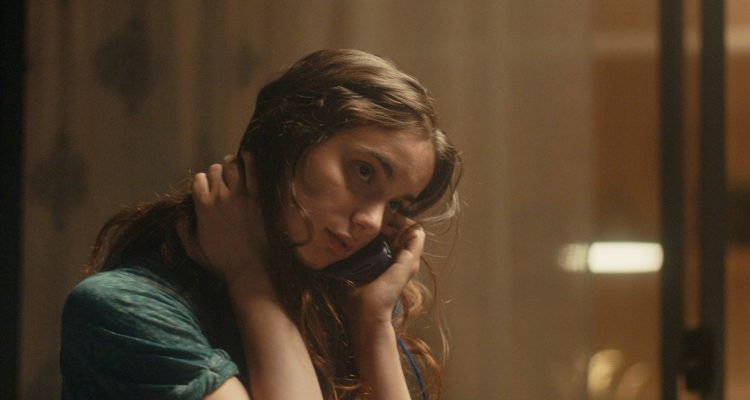In his third indie directorial effort, “First Girl I Loved,” which won the “Best of NEXT” audience award at Sundance 2016, writer/director Kerem Sanga tackles the complicated and high-stakes world of teenage sexuality, which is hard enough even if you’re not queer. So it’s infinitely more difficult for self-possessed loner Anne (Dylan Gelula) when she falls hard and fast for softball star Sasha (Brianna Hildebrand). Sanga’s film recreates that dreamy haze of first love and lust, and the fumbling, often traumatic efforts of teenage courtship.
The story unfolds in two non-linear storylines that are wrapped around each other. In the first, Anne attempts to come out to her best friend Cliff (Mateo Arias) with whom she has let her guard down. Cliff surprises her with his reaction to her confession, and turns out to harbor feelings of entitlement toward Anne and her own sexuality.
 While that story is bubbling under the surface, Anne begins her own halting attempts to get to know Sasha, under the ruse of a yearbook senior goodbye. The girls connect instantly, though the nature of their connection is often unclear to both. They communicate in a barrage of text messages, which Sanga renders as warm voiceover conversations. Their screens offer the protection of distance, and Anne pushes the innuendo about as far as it will go. Connected but physically apart, the girls grow closer.
While that story is bubbling under the surface, Anne begins her own halting attempts to get to know Sasha, under the ruse of a yearbook senior goodbye. The girls connect instantly, though the nature of their connection is often unclear to both. They communicate in a barrage of text messages, which Sanga renders as warm voiceover conversations. Their screens offer the protection of distance, and Anne pushes the innuendo about as far as it will go. Connected but physically apart, the girls grow closer.
The awkward beginnings of a burgeoning is it or isn’t it relationship between the girls have a few moments that tend toward teen lesbian fantasy that stretch the suspension of disbelief within a film that is for the most part emotionally authentic. But those tendencies are pulled back by the constantly simmering tension between Anne and Cliff, which Sanga slowly parcels out throughout the course of the film.
 We see confrontations between them and then hop back to the day Anne made her confession, where we get to see the rest of the scene and understand her aggression and resentment toward a friend who betrayed her trust. The double storylines wouldn’t be enough to sustain the film on their own, but woven together they illustrate the complicated ways in which teenagers attempt to explore their sexuality, making mistakes along the way.
We see confrontations between them and then hop back to the day Anne made her confession, where we get to see the rest of the scene and understand her aggression and resentment toward a friend who betrayed her trust. The double storylines wouldn’t be enough to sustain the film on their own, but woven together they illustrate the complicated ways in which teenagers attempt to explore their sexuality, making mistakes along the way.
But as the film rounds the bases, it drives home the fact that in high school, your sexuality is not your own. It’s shaped by the gaze of peers, parents, and teachers, who all feel they have a stake in the people these teenagers will become. For female sexuality, it’s shaped by the gaze of men who feel they have some ownership or right to it.
 Anne’s surly flailing against the pressures of those around her illustrates her desire to break free from systems of control and be her own person. Gelula pitches her performance just at the right level of defensive and sensitive, never allowing Anne to stray into a sarcastic stereotype, delicately balancing her anger and vulnerability.
Anne’s surly flailing against the pressures of those around her illustrates her desire to break free from systems of control and be her own person. Gelula pitches her performance just at the right level of defensive and sensitive, never allowing Anne to stray into a sarcastic stereotype, delicately balancing her anger and vulnerability.
Hildebrand demonstrates a fine emotional range far from her role as the tough-as-nails Negasonic Teenage Warhead in “Deadpool.” She’s soft, naive, innocent, and impressionable, and her softness brings out the softness in Anne herself.
 Cameron Esposito, Tim Heidecker and Erik Griffin appear as various adults who influence Anne’s life. Heidecker is particularly good as the high school guidance counselor, giving a sincere and earnest dramatic performance, while Esposito is the one person who gives Anne a non-judgmental ear.
Cameron Esposito, Tim Heidecker and Erik Griffin appear as various adults who influence Anne’s life. Heidecker is particularly good as the high school guidance counselor, giving a sincere and earnest dramatic performance, while Esposito is the one person who gives Anne a non-judgmental ear.
Sanga’s roundabout storytelling and sensitive exploration of contemporary issues around sexual identity and consent makes “First Girl I Loved” a sophisticated and complex teenage coming of age story. It’s Gelula’s performance that brings the emotional weight necessary to drive the story forward.
“First Girl I Loved” is available on digital VOD platforms.

